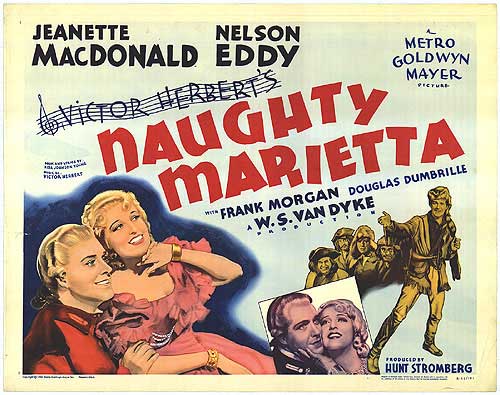Continuing the process of cleaning out my DVR, I watched the 1935 film, Naughty Marietta. I recorded Naughty Marietta off of TCM on April 3rd. Like many of the films that I record off of TCM, Naughty Marietta was nominated for Best Picture. In fact, if not for that Oscar nomination long ago, Naughty Marietta would probably be totally forgotten.
Instead, it’s only partially forgotten.
Based on an operetta and containing at least one song that I’ve sung while drunk (that song, incidentally, would be Ah! Sweet Mystery of Life), Naughty Marietta tells the story of Princess Marie (Jeanette MacDonald). A Spanish princess, Marie is engaged (against her will) to the elderly Don Carlos (Walter Kingsford). In order to escape a life of forced marriage, Marie pretends to be a servant girl named Marietta and stows away on a boat to New Orleans. The boat is carrying women to the new world so that they marry French colonists. The other women on board are shocked when Marietta announces that she plans to never marry.
However, they are even more shocked when the boat is taken over by pirates! The pirates kill the crew and take the women prisoner. The pirates take the women to Louisiana where, fortunately, a group of mercenaries led by Captain Richard Warrington (Nelson Eddy) show up and rescue the women.
Marie negotiates for Warrington to take the women to New Orleans and it’s obvious from the start that Marie and Warrington are attracted to each other. However, Warrington claims that, much like Marie, he plans to never marry! Oh my God, could it be that these two are meant to get together!?
It has all the potential for being a good musical and Jeannette MacDonald gives a good performance as Marie. But, unfortunately, Nelson Eddy is a lot less charismatic in the role of Warrington. Even his singing voice is a bit blah. Oddly, Naughty Marietta was one of many romantic musicals that Jeanette MacDonald and Nelson Eddy made together. The reason I use the term “odd,” is because — judging from this film — they didn’t appear to have much onscreen chemistry. Whereas MacDonald is personable and relatable, Nelson Eddy seems to hold the audience at a distance. Watching a film like this, you can’t help but regret that Jeanette MacDonald didn’t have someone like Fred Astaire for a co-star.
As for Naughty Marietta‘s best picture nomination — well, it was a big production and it was also an adaptation of a popular operetta. At a time when 10 films were nominated every year and the studios pretty much controlled which one of their films was nominated for best picture, Naughty Marietta got a nomination. However, the Oscar went to Mutiny on the Bounty.

